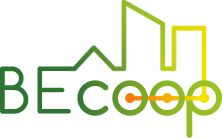Activating the community energy market for bioenergy
In the updated Renewable Energy Directive (RED II), the EU clearly considers community energy as a key factor for future Renewable Energy (RE) market uptake and mandates Member States to implement regulatory frameworks for enabling and facilitating this process.
At the same time, several barriers prevent citizens from becoming (bio)energy producers and bioenergy projects from being more appealing:
Lack of preparedness for communities to tap the full bioenergy market potential,
Lack of stakeholders’ awareness of the communities’ potential and
Missing/ unsupportive (local, regional and national) framework and policy conditions,
For a fair and people-powered energy system, BECoop (2020-2023), a project funded by the European Horizon 2020 programme, aims at putting communities in charge of their local renewable (bio)energy generation, making these barriers fall.
About BECoop
BECoop will focus on mobilizing citizens around bioenergy initiatives, increasing knowledge and acceptance of bioenergy, especially for domestic heating purposes.
The project will assist the new initiatives by identifying the most suitable technical, business and financial solutions, tested on the ground in four complementary cases of energy communities and local/national authorities. These pilots will then be replicated then to more EU cases.
How? With key activities that can be grouped under 4 main scopes of action:
Bioenergy heating context analysis, with EU-wide surveys,
Development of tools and services, supporting a broad range of stakeholders (from technology providers to policymakers) in replicating the action,
Community building, with many networking activities and capacity building,
Replication and policy, at local, regional, national and EU level, through events and advocacy activities, to further empower policymakers to introduce enabling frameworks for community bioenergy.
BECoop pilot areas
BECoop pilots are complementary (representing diverse framework conditions, community bioenergy maturity, RE penetration in the heating and cooling market, and socioeconomic environments) and hold a high replication potential across the EU. They are:
BECoop will leverage lessons learned from the pilots to provide valuable knowledge on the socio-economic and environmental impact as well as on the public acceptance of BECoop’s interventions.
RESCoopsi: GOIENER (ES), ESEK (GR), SEV (IT, lighthouse example)
The RESCoops of the project benefit from technical, financial, and business support services to expand their activities in the heating market. BECoop offers them a methodology to develop projects and assess their feasibility, as well as strengthen the relationship with local institutions and increase their market share. The SEV lighthouse case, a federation of RESCoops combining the characteristics of the other cases, will help BECoop in highlighting the economic, environmental and social bioenergy benefits compared with other energy sources.
Municipalities: OBS (PL)
The project will assist OBS in the promotion of community energy as well as in addressing its decarbonisation objectives that are largely hindered by the fossil fuel heating in the area. OBS will use the BECoop results to increase environmental awareness around bioenergy, develop a local bioenergy RESCoop, increase local acceptance of bioenergy as well as develop new entrepreneurship opportunities emerging from the thermal energy and local biomass supply chains.
Renewable Energy Authorities: FIPER (IT), supported to initiate a new RESCoop focusing on bioenergy heating
BECoop will provide FIPER new knowledge from the development of bioenergy RESCoops then transferred in the district heating systems and municipalities that are members of the association.
BECoop four tools
- The Knowledge Exchange Platform: a one-stop-shop lifting collaboration barriers across regions and sectors to share information and knowledge. It allows early stage RESCoops to pool the expertise of their peers already being successful, like the collaborative nature of the RESCoop concept suggests.
- The BECoop (self) assessment tool: for communities and other stakeholders to assess the status and potential for community bioenergy with recommended technical and business actions.
- The BECoop inventory of tools: an online repository of existing open-source tools that can complement the support services required for community bioenergy project development.
- The bioenergy RESCoop e-market environment: connects supply chain stakeholders and supports them when developing a community bioenergy project.
Bioenergy?
Bioenergy refers to energy derived from the conversion of non-fossilised organic, natural sources, such as wood, agricultural crops or organic waste, which can be used for electricity, heating, cooling and transport.
Bioenergy is flexible and reliable, storable, dispatchable and most often locally sourced. For several European countries, bioenergy ensures their transition from fossil fuels, replacing oil, gas, and coal in the electricity and heating sectors. Forestry / woody biomass (wood chips, pellets, logs) is the most important bioenergy source and represents more than two third of the EU bioenergy consumption.
Communities?
Energy communities are voluntary groups of individuals cooperating to provide environmental, economic or social community benefits to members rather than to generate financial profits. Communities (over 3500 in Europe) include cooperatives, eco-villages, small-scale heating organisations and other projects led by citizen groups (JRC, 2020).
Energy communities and cooperatives (RESCoops) can empower a more effective, fair, and democratised clean-energy transition, leading to an increased social and consumer acceptance of renewable energy developments. Renewable bioenergy communities have a key role to play for a sustainable future, holding a series of benefits:
Communities producing heat through bioenergy are still scarce. BECoop will strive to make barriers fall, empowering energy consumers to make informed decisions and become active prosumers acting as crowdsourcers and crowdfunders of the energy transition, ensuring transparent, safe and secure access to community energy and energy justice.
